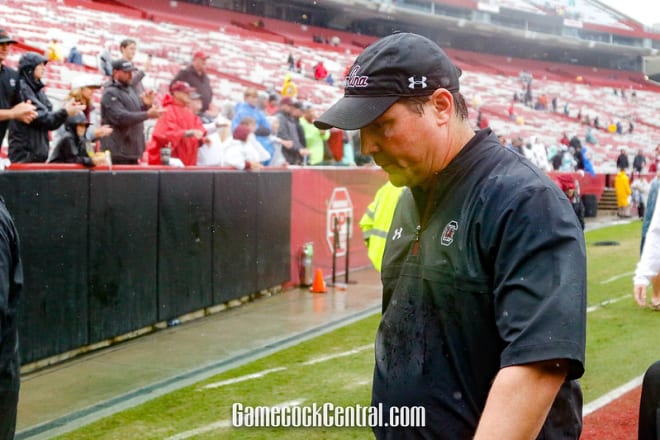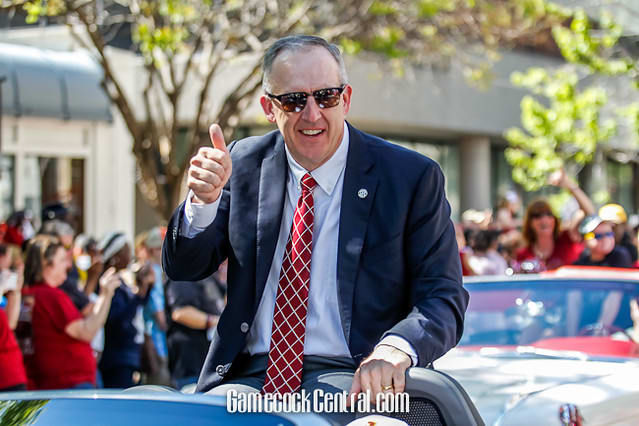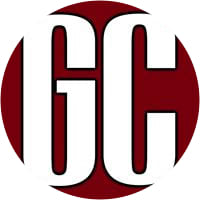The sound of silence
EDITOR'S NOTE: Since this column's publication, the SEC released a generic statement on the league's officiating.
***
SEC commissioner Greg Sankey sat in front of media prior to last season’s SEC Football Championship game and promised a “deep dive” into the league’s football officiating. If what we are observing during the 2019 season is a result of those efforts, then consider his expedition a massive failure; more shallow water snorkeling than any deep dive.
No game better illustrated this point than South Carolina’s contest against Florida on Saturday, when a competitive game between two evenly matched teams was overshadowed by an absurd display of incompetence on the part of the officiating crew. Act Two took place later that night, when Tennessee’s football team was served with some bizarre calls against Alabama.
After a period of several months patting itself on the back for its quality and promising greater transparency in the realm of officiating, the conference’s leadership has been completely silent since Saturday.
This, in and of itself, is not a great surprise; Sankey has proven during his tenure to be conflict-averse. What it is, however, is disappointing, especially to those that closely follow a conference in which everything is magnified and more meaningful than the average.

For all the conference’s platitudes about improving, the most important issue is this: there is no indication that the officiating on the field has achieved said improvement, nor is there any real transparency.
During the 2019 offseason, the conference hired Deloitte, an international accounting firm, to review its practices. Sankey revealed during SEC Media Days this summer that the conference’s officials were perceived as better game managers than their peers, according to an external review.
Steve Shaw, the coordinator of football officials, began to grant more interviews and became more of a public face. Through Shaw and other media avenues, the league began to publicize more information about official salaries (about $3,000 per game, according to Sports Illustrated, but it can vary), the conference’s conflict of interest policy, and how its officials are trained, and official workflow, among other things.
The conference also began a Twitter account (@SECOfficiating) to shed light on policies and procedures and to educate the public on calls. Comments in the months that followed from Sankey, Shaw and other conference officials made it clear that the league would have more of a visible presence when it came to its officiating program.
While the public may have been misled by the commissioner into thinking that the conference was also taking steps to improve the most visible and important aspect of officiating – the ability and/or willingness of its hired officials to consistently make correct calls – the last several months have served to effectively pull the curtain back on the SEC’s true intentions.
That is, the conference has really been using the promise of greater transparency as another arm of the conference’s public relations department. Upon review, this was easy to see coming, since Sankey has been on record multiple times in saying the conference needs to highlight the successes of its officials.
Indeed, the aforementioned Twitter account dedicated to officiating has sent out posts about calls in nine specific games this season, with all of them discussing how the correct call was made on the field. There is a place for this type of thing, to be sure. Some observers need or want education on calls from games, and Sankey is generally correct when he asserts that officials get it right more often than not.
Yet when it comes time to highlight a mistake, this account – and the conference in general – prefers to retreat. When it comes to providing actual, tangible transparency on officiating – things like grades, admitting missed calls, revealing solutions and/or disciplinary actions for officials- the league is also quiet or has inadequate responses.
Fines for coaches and administrators who dare to question the status quo are performed with efficiency and widely disseminated publicly to the conference’s huge and passionate fan base.
Student-athletes who err are subject to suspensions and subsequent reporting that highlight their failures, but disciplinary actions on officials appear sparse, and information on the league’s handling of those officials is akin to classified information.

On Monday, Tennessee head coach Jeremy Pruitt wondered aloud about the consequences for officials compared to others under the conference umbrella.
“We make mistakes as coaches,” he said. “They’re going to make mistakes as officials. Players make mistakes, we all do. Nobody’s perfect. Unfortunately, we’re all held accountable, and from an accountability standpoint, it’s tough. What’s the repercussions here?”
This uneven style is nothing new for Sankey. After all, he fined South Carolina basketball coach Frank Martin $25,000 in 2018, less than two days after Martin questioned officiating assignments. Yet, Sankey took three weeks to issue a fine to Missouri AD Jim Sterk after he accused Dawn Staley of fostering a racist environment at her home arena, and that only after she filed a defamation lawsuit against Sterk.
The conference’s priorities – the SEC’s equivalent of the NFL’s “protect the shield” – are evident in its practices.
As for South Carolina’s game, there was a rash of inexcusable mistakes by the officiating crew that happened to take place on critical plays; an uncalled false start and 40-plus yard holding during a Florida touchdown run and an obvious but non-flagged offensive pass interference on a Gators touchdown pass.
GamecockCentral.com reached out to Southeastern Conference officials regarding Saturday’s contest. Specifically, the conference was asked if any statement would be released on the game’s officiating, a request was made for clarification on some specific calls that were not made in the contest, and an inquiry was made as to whether or not corrective action would be taken. The conference has not responded.
The commissioner frequently talks about the integrity of the game, yet in more than one instance has allowed officiating crews to trot onto the field that have diminished the student-athletes’ ability to fully determine the outcome. When that happens, the coaches, student-athletes, administrators, and fans of those programs are left with little remedy. The calls on Saturday were not close calls; they were obvious. It was officiating malpractice, and it’s negligence on the part of anyone allowing it to happen, particularly when the response is inadequate or nonexistent.
South Carolina, of course, cannot go on the field and replay those snaps. There is no recourse for teams that go through this, and that has to be the maddening part for them. Directly after the game, a still-fuming Will Muschamp directly – with strong words - addressed the manner in which an official assessed an unsportsmanlike conduct penalty. On Sunday, he was rightfully resigned to the fact that nothing he could do or say would change what transpired on the field.
“Nothing I’m going to say is going to change anything,” Muschamp said during his weekly teleconference. “We all saw what happened. That’s in the conference office’s hands.”
On Tuesday, Muschamp noted during his press conference that both he and athletics director Ray Tanner had been in contact with the league office and were both awaiting a response. He also said that Greg Sankey sent him a text message on Sunday night saying that the league was still in the review process. Asked if he expected to hear back from the league, Muschamp said “I would hope so.”
As of this writing, the SEC has neglected to release a statement.
Sankey was asked during a conversation with AL.com back in 2016 whether officials should be held publicly accountable when errors are made.
"We're prepared to acknowledge improper application of rules when they occur," he said. "I'm not one who thinks you necessarily gain from a suspension."
From here, what Sankey has is an opportunity to recognize the flaws in the system and to institute some type of meaningful change. Does that mean actual, timely transparency with schools, fans, and media on officiating? Is it more effective training and oversight, beyond what's already been expanded, for officials and greater repercussions for their gaffes? Importing officials from across the country? Should the conference pay fines back to member schools in situations like this? It’s the job of Sankey, who is paid around $2 million per year, to find some solutions quickly.
Because what the league’s response to its blunders so far can be summed up by one word that Will Muschamp used back on Saturday:
Gutless.
***
Support our work by becoming a member of GamecockCentral.com today and get 50% off your first year of an annual subscription with promo code BAW4. It gets you access to all our insider content Here's how to sign up...
Already have a free log-in or are a former subscriber? Click here to subscribe and make sure the code BAW4 is entered!
Completely new subscribers? Click here to sign up and make sure the code BAW4 is entered to get your discount!


